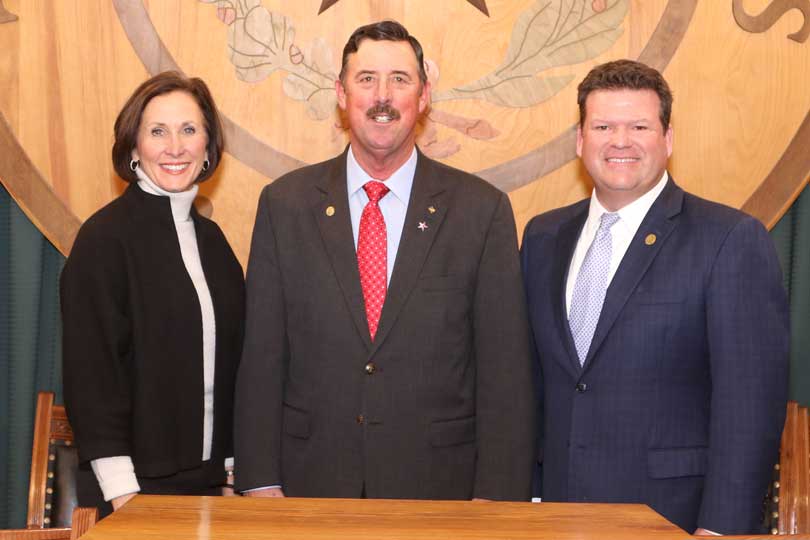By Julie Tomascik
Editor
In a rapidly growing state, many Texas private property owners face the threat of eminent domain.
All too often, two lawmakers said, those landowners are at the mercy of the private companies who condemn their property.
That’s why they filed legislation to change the law on how private entities with eminent domain must negotiate to acquire property before resorting to condemnation.
State Rep. DeWayne Burns (R-Cleburne) and State Sen. Lois Kolkhorst (R-Brenham) outlined the details of their companion bills—HB 991 and SB 421.
“Our goals with HB 991 are to improve current eminent domain law by enacting a more transparent, fair and predictable system; to provide property owners with more information to give them even footing in the negotiating process; and to implement protections for landowners against entities that act in bad faith,” Burns said.
The bills would mandate that all easement agreements used for pipelines or electric transmission lines include minimum protections for landowners. They call for standardized easement forms that include a maximum number of pipelines, easement rights, how the entity will access the easement, prohibit transfer of the easement and more. A provision regarding the use and repair of any gates and fences is also included.
Companies that use eminent domain would be required, in certain circumstances, to hold public meetings within the counties they would be asserting eminent domain. These meetings must be held before the company can acquire any property.
In addition, there would be consequences for making a low initial offer.
“Private entities often offer less than the fair market value,” Kolkhorst said. “This bill will contain a provision designed to prevent those lowball offers.”
If damages awarded by the special commissioners are 25 to 100 percent greater than the initial offer, then the companies would have to make an additional payment to the property owner of up to 35 percent of the special commissioner’s award.
“This will lead to a more transparent, fair and accountable eminent domain process,” Burns said.
Texas Farm Bureau (TFB) and other agricultural organizations and landowner groups support the proposed legislation.
“We understand the rapid growth of our state will call for sacrifice, careful planning and yes, eminent domain,” TFB President Russell Boening said. “However, Texas farmers, ranchers and rural property holders have a constitutional right to fair treatment and just compensation. These improvements should not be made on the backs of Texas farmers, ranchers and rural property holders.”
Boening noted eminent domain is an issue of fairness and transparency at the most basic level.
“The takings of rights of way for these projects will earn millions of dollars over many years for those who take the property,” he said. “We propose only that those takings be done transparently, with property owners having a clear understanding of their rights. There must be true good faith offers and consequences if that does not occur.”
In Texas, about 95 percent of the land is privately owned, meaning eminent domain doesn’t stop in rural areas.
“This isn’t just about rural Texas. This is about all Texans,” Kolkhorst said.
Burns echoed that statement, noting that all Texas private property owners deserve fairness, transparency and landowner protections.
A growing state with a strong appetite for new development will continue to put a target on private property, leaving landowners searching for a fair offer in eminent domain cases, the landowner groups said.
Boening urged lawmakers who support private property rights to co-sponsor the bills.
“Eminent domain reform is the property rights issue of our time. We call for champions of property rights to step forward and be counted,” Boening said. “It’s time for Texas to become the property rights state that we’d like for it to be.”
Burns and Kolkhorst outlined the bills during an initial press conference on Jan. 23 in Austin. TFB, Texas and Southwestern Cattle Raisers Association and Texas Wildlife Association were in attendance and spoke in support of the legislation.
For a detailed summary of the bills, more information and updates on eminent domain throughout the legislative session, visit


I would be much more concerned with taking private land for parks and trails. There are several in-state and out-of-state groups working together to do just that. They plan to use endangered species, wetlands, flood control, public use for parks and trails to use eminent domain, to take private property. I personally was at several of these meetings. When I asked, “Do you plan on using eminent domain?”, their response was that they couldn’t say that they will or won’t, but they plan to get that land.
As a land owner in east Texas we should receive. Rent money for the piipes lines crossing our land every month.Rich companies move in pay a one time cheap ass fee an make thousands useing our land fo 50 to 100 years.They should have to for past line an. Past electrical lines and equip past an present you damn sure Can’t use the land were big tanks heater. Treaters an large compressors are built for anything. The companies make millions of four properties and should have a lump sum payment And monthly rental for what ever a private companies builds on the ground or in the air..They are able to pay millions in salary. Just to the CEO .its damn time land owners are treated fair for over 50 to 100 years of use for our land. Lump sum an monthly monthly rental fees based on amount of land used